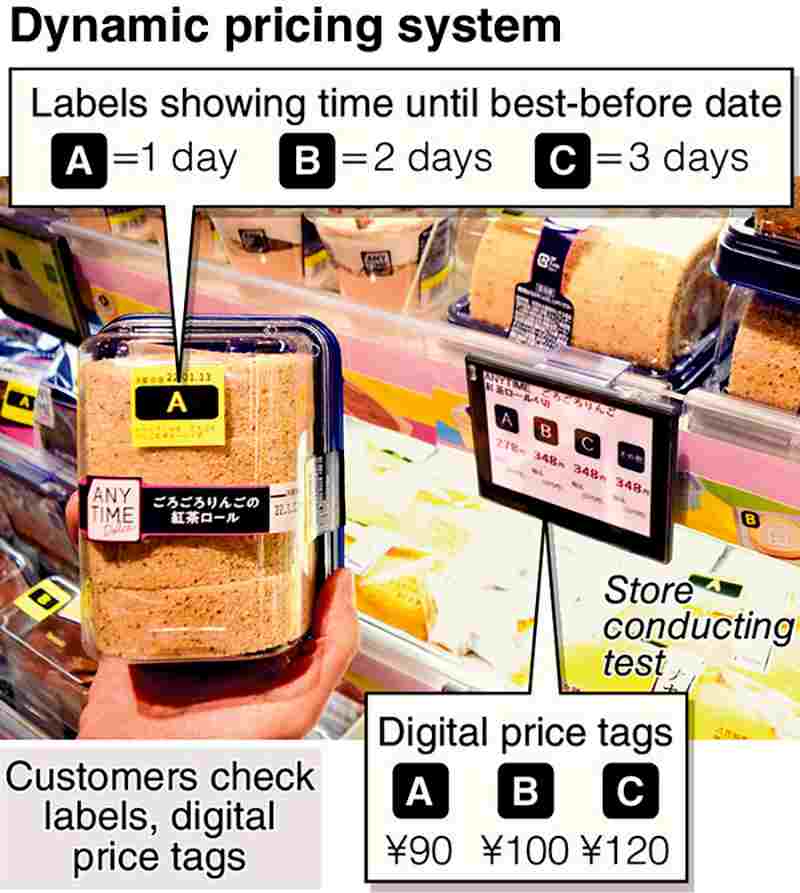
15:10 JST, January 26, 2022
A test using a dynamic pricing system that aims to reduce food waste of still-edible products is being conducted at a supermarket in Tokyo.
Dynamic pricing is the process of lowering a product’s cost as the item nears its best-before date.
The test is being conducted by the Japan Research Institute and Ito-Yokado Co. through the end of February.
The results will be verified and used to raise the awareness of store staff and consumers.
In the confectionary section of Ito-Yokado’s Hikifune store in Sumida Ward, Tokyo, the same products are categorized into three types and labeled “A,” B” or “C,” denoting three different prices that are displayed on digital price tags.
The prices are based on the number of days left until the best-before date of each product.
For example, if the date is two days away, the price is 10% off the list price. The product will be discounted 20% the next day. Customers can check the prices and choose a product accordingly.
Discounted prices in the evening for food that does not last long, such as premade dishes, have become a familiar sight in supermarkets.
The test covers 16 products, such as sweets and tofu, that have best-before dates of a few days. The digitized system allows for the collective management of the prices of various products, eliminating the need to physically change price tags and making the discounting operation more efficient.
A dynamic pricing system is based on various factors, including the time of day and busy hours. The aim is to improve profit and efficiently manage inventory through flexible pricing. In the United States and European nations, discounting systems based on digitally forecasted demand have been introduced in recent years.
The Japan Research Institute and other entities believe that a system allowing for frequent price changes based on an approaching best-before date is effective in reducing food waste.
Supermarkets and convenience stores often put products nearing their best-before date at the front of shelves, and customers aware of this practice sometimes select products from the back of shelves.
Food in front may reach its best-before date and then be discarded. Food nearing its best-before date is more likely to be purchased if it is discounted.
However, few major Japanese companies have introduced a dynamic pricing system because digital price tags cost several thousand yen per unit and require maintenance fees. Companies with many stores are wary of increasing operating costs, and so are believed to be studying the introduction of such a system from the perspective of not only food waste but also business performance.
“The key to the spread of dynamic pricing systems will be how inexpensively related equipment can be introduced,” said retail industry analyst Hiroaki Watanabe.
5.7 million tons discarded
Food waste in Japan in fiscal 2019 amounted to 5.7 million tons, although the figure decreased by 5% compared to the previous year, according to estimates by the Agriculture, Forestry and Fisheries Ministry. This is the equivalent of everyone in the country throwing away a bowl of rice every day.
In a time when poverty is a global problem, Japan could be seen by the world as not effectively utilizing its food. Concerns also exist about the increased environmental impact due to the disposal of discarded food.
Dealing with food waste that occurs in households is also an important issue.
As part of the test, a trial was conducted with about 100 men and women encouraging them to use all of the food in their homes. A meal management app, which makes suggestions for a well-balanced diet, keeps a log of data related to foodstuffs purchased and food in stock at home so users can cook a meal.
Top Articles in Society
-

Man Infected with Measles Reportedly Dined at Restaurant in Tokyo Station
-

Man Infected with Measles May Have Come in Contact with Many People in Tokyo, Went to Store, Restaurant Around When Symptoms Emerged
-

Woman with Measles Visited Hospital in Tokyo Multiple Times Before Being Diagnosed with Disease
-

Australian Woman Dies After Mishap on Ski Lift in Nagano Prefecture
-

Foreign Snowboarder in Serious Condition After Hanging in Midair from Chairlift in Nagano Prefecture
JN ACCESS RANKING
-

Japan PM Takaichi’s Cabinet Resigns en Masse
-

Japan Institute to Use Domestic Commercial Optical Lattice Clock to Set Japan Standard Time
-

Israeli Ambassador to Japan Speaks about Japan’s Role in the Reconstruction of Gaza
-

Man Infected with Measles Reportedly Dined at Restaurant in Tokyo Station
-

Videos Plagiarized, Reposted with False Subtitles Claiming ‘Ryukyu Belongs to China’; Anti-China False Information Also Posted in Japan




















